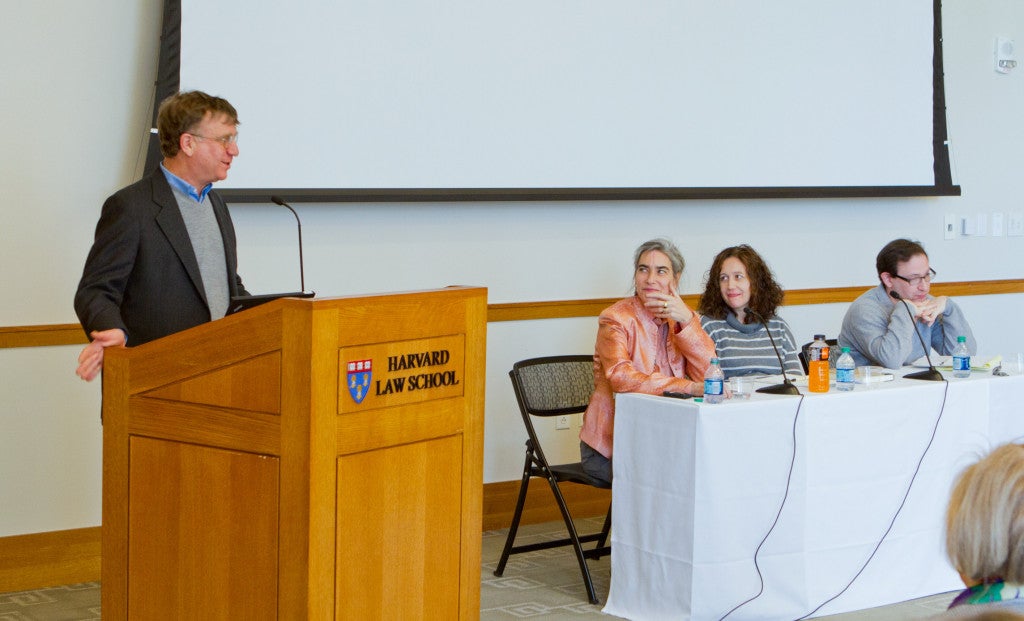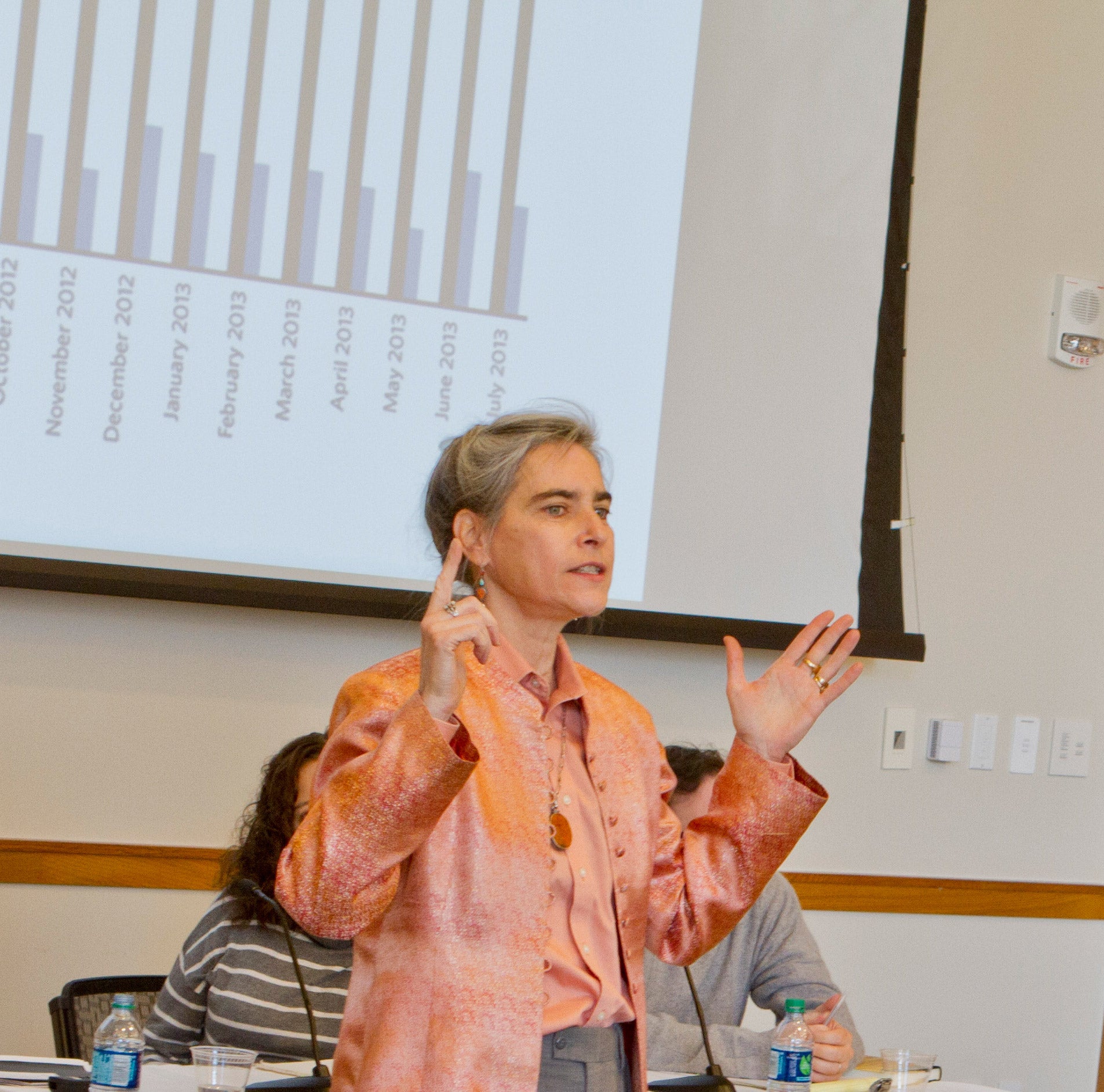While serving as an NPR correspondent covering the fall of the Taliban, Sarah Chayes decided to stay in Afghanistan and assist in its rebuilding. The mud houses being rebuilt required stone foundations, and the material was plentiful, but the town’s governor had declared ownership of the stone, crushing and selling it to rebuilders at inflated prices. “And that was my first introduction to corruption, and to corruption in Afghanistan” she explained.
In a talk sponsored by International Legal Studies on February 11, Chayes, currently a senior associate at the Carnegie Endowment, spoke to HLS students about the links, historical and current, between corruption and global security.
Introducing Chayes to the audience, Harvard Law School Professor William Alford ’77, vice dean for the Graduate Program and International Legal Studies, detailed her extensive experience: Following her career as a journalist, she served as special adviser to the chairman of the Joint Chiefs of Staff regarding policy on Afghanistan, Pakistan, and the Arab Spring, and authored both “The Punishment of Virtue: Inside Afghanistan After the Taliban,” and most recently “Thieves of State: Why Corruption Threatens Global Security.” Among Chayes’ distinctions, noted Alford, are the Oprah Winfrey Chutzpah Award, Tufts University’s Jean Mayer Global Citizenship Award, and a recent interview with Jon Stewart on The Daily Show.
Chayes’ focus, at the moment, is in delving into the effect of widespread corruption: “What’s lighting up the newspapers every day? Ukraine, Yemen, Bahrain, Egypt, Nigeria. They’re fairly dispersed, and they’re pretty different cultures […] and I would argue that every one of these environments is an acutely corrupt environment.”

The money involved in corruption is “not chump change,” Chayes said, showing a chart detailing the $20 billion shortfall of Nigerian national oil sale profits that actually make it into government accounts, and discussing two independent surveys that showed “petty bribes” paid out in one year totaling between $2-5 billion. “This is serious money that can actually have a development impact.”
An aspect of corruption that is not being explored, and should be, argued Chayes, is the personal side—the abuse and humiliation that it inflicts, and how it creates today’s terrorists and religious extremism. “The cops don’t just politely ask you for your money. It’s abusive, it’s humiliating, it’s insulting. They flaunt their impunity, [and] it makes people mad. Then [someone gives] you a Kalashnikov and tells you to use it, and then they give you a moral and political justification: it’s because their government is an impious government, and if only the government obeyed the strictures of religion, then all of its officials, including the police, would be behaving according to religion and wouldn’t be stealing from you and wouldn’t be abusing you.”
Chayes then delved into historical documentation, “…looking at constitutions as a kind of corruption prevention mechanism,” and quoting Martin Luther, John Locke, and even Osama Bin Laden’s writings on how failed legal remedies can result in violent extremism. Linking this to current events and anti-terrorism strategies, she explained, “If you don’t understand why this exploitation works, if you don’t try to reduce the grounds for that argument, we, the U.S. government, will just keep minting terrorists faster than we can take them out.”
In closing, Chayes said “I’m not trying to say that corruption is the sole driver. The way I’m trying to think about it is that corruption is almost like an accelerant, an ‘exacerbator,’ of other risk factors.” Driving Chayes’ focus, she noted, is the fact that corruption is often overlooked: “We heard all about the Arab Spring, and we all heard about the importance of the youth vote, and we all heard about unemployment, but I didn’t hear as loudly about corruption here as I did on the streets of Cairo or Tunis.”
Following Chayes’ presentation, Harvard Law School Professors Matthew Stephenson and Kristen Stilt offered commentary.
Stilt focused on the causal connections between corruption and radical Islamism, using examples from Afghanistan, Nigeria, and Egypt. “With Afghanistan we have a question of the origin of the Taliban’s recent resurgence: Why after so many years of suffering under the Taliban would [Afghanis] turn in that direction? And from an American national security standpoint, that is perhaps the most important question.”
The Nigerian model, explained Stilt, is also one of origins, in this case of Boko Haram, and stems from the adoption in northern Nigeria in the early 2000s of laws from classical Islamic law, such as hand amputation for theft, in the hopes that they would reduce corruption but that actually only address petty crimes.
The case of Egypt, which Chayes terms a “military kleptocracy,” explained Stilt, is still complicated and emerging: “We don’t know yet. We know [it] hasn’t descended into civil war, we need to wait and see—who will run in 2015, who will win? Will the Muslim brotherhood boycott? Will they participate? How will the new parliament govern when the military kleptocratic complex is still in place?” Stilt concluded by encouraging Chayes to examine the emergence of ISIS, which was still at the margins of international attention when Chayes’ book was published.
Stephenson noted the difficulty of striking a balance in fighting corruption. “The backing for these regimes helps to suppress the movement, but also creates more of them, so there’s an inflow and an outflow—the question is which of these is bigger?” He then described his favorite “nuggets” from Chayes’ book: Be wary of your handlers and helpers, as they have their own agendas and influencers; be wary as well of intelligence agencies, as they may freeze out other experts and organizations that have important advice. Old-school crime-fighting methods, such as mapping out cases and trends, can be effective.
In closing, Stephenson discussed the importance of considering models that do not adhere to the violent extremism reaction, such as the Tiananmen Square protests, in order to better understand why and how those differences occur.
Following a brief question and answer session with students, Alford thanked Chayes, noting that her mother, Tufts Fletcher School Professor Antonia Chayes, who was in the audience, was surely extremely proud of her work, as would be her late father, Harvard Law School Professor Abram Chayes. In turn thanking the audience, Chayes responded, “[My father] did corruption work, and I didn’t plan to do [this], I kind of fell into it, but I do feel like it’s in the genes.”
